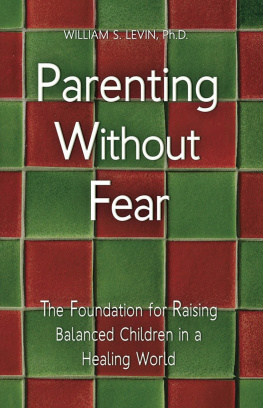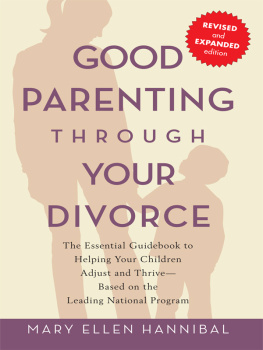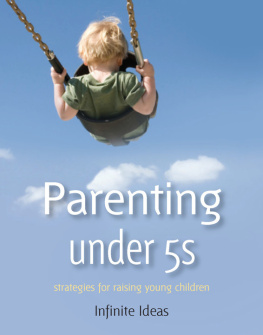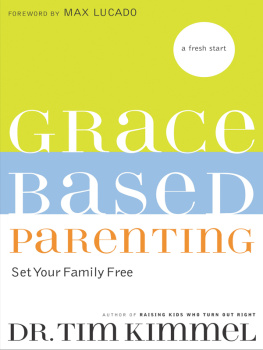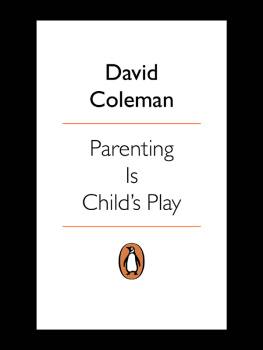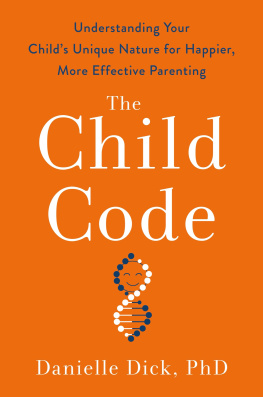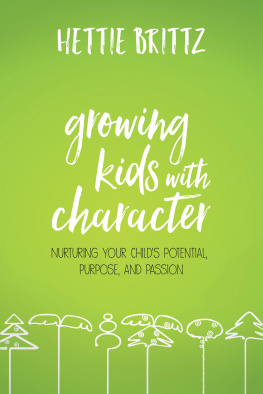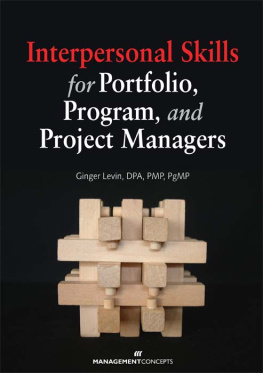Copyright 2013 by William Levin, Ph.D.
All rights reserved. No part of this publication may be reproduced, stored in a retrieval system, or transmitted, in any form or by any means, electronic, mechanical, photocopying, recording, or otherwise, without the written prior permission of the author.
Figure 1 created by Susan Levin, Psy.D.
This book is designed to provide accurate and authoritative information in regard to the subject matter covered. However, neither the publisher nor the author is engaged in rendering professional advice or services to the individual reader, and this book is not intended as a substitute for advice from a trained counselor, therapist, or other similar professional. If you require such advice, seek the services of a competent professional.
ACKNOWLEDGEMENTS
Generally when authors are acknowledging their editors, they imply that their own writing skills are barely adequate and that without the editorial assistance that theyve received, the book would be nearly unreadable. I always read such statements with a sense that they protest too much. I assure you that as I now say just such things, it is not false modesty. My poker buddy, friend, and editor, Mel Foster, brought his great skills and generosity of spirit to the project of decontaminating my writing, so as to remain most empathically attuned to you, the reader, throughout the discussion. I fought him every step of the way. In the end, after I truly surrendered to his less-is-more editorial wisdom, I recognized that what I was letting go of was the ego in the writing. I am forever grateful for Mels sage and artful excisions, and so would you be, my reader, if you only knew.
When a writing project extends as long as this one has (nearly two decades of weekend mornings, the only times I write), and when it involves so much rethinking of our basic presumptions, a great many people (family, colleagues, friends, and clients) can and do make meaningful contributions to both the thinking and the writing, and I am grateful to you all.
First and foremost, I want to acknowledge (gush about, really) my wife and life partner, Beth, for her multiple roles as collaborator, sounding board, cheerleader, reluctantly frank critic, and uncomplaining supporter of my many hours of unavailabilityand those are just the roles that relate directly to the book. Most of those roles also fell, to lesser but meaningful degrees, to my three amazing children, Anne, Susan, and Tom. For their help with the book, I am deeply grateful to the four of them, and for their presence in my life, I am blessed beyond my fondest imaginings.
My treasured friend, mentor, and office mate, Karen Martin, has been involved and engaged with the project every step of the way, and her challenging insights and loving support have been invaluable. My dear and oldest friend, Ken Anbender, a professional wise man, initiated two-man writing retreats with days-long dialogues that were as helpful as they were pleasurable. Along the way, another cherished friend and mentor, Sebern Fisher, arrived in my life, and she, too, has provided a prized blend of analytic challenge and loving support. And while three such precious friends and collaborators would be more than my fair share, I have yet another five who comprise the study group who were kind enough to admit a man into their midst: Lynn Barron, Barbara Bronner, Mona Fishbane, Bonnie Lessing, and Alice White.
My supervisees and mentees over the years have all served as captive sounding boards and collaborators in the unfolding synthesis of the perspectives set forth in the discussion. Three men have logged the most extensive hours in that regard, becoming prized friends in the bargain, and I am especially grateful to each of them: Michael Fitzgibbons, Bob Gottlieb, and Doug Bolton.
In addition to all of the above-mentioned, a few kind friends, relatives, and even just acquaintances over the years have volunteered as readers and/or publishing advisors, and I thank them each for their generosity: Joanne Bernstein; Dan Callistein; Matt Dewar; Lisa Kohut; Rochelle Miller; Julia Mossbridge; Donna Orwin; Dov Taylor; Jean Walbridge; and Caren Yanis. I want to thank, as well, the therapists, teachers, teaching assistants, and staff at North Shore Academy in Highland Park, Illinois, who have over the years given so much to me as I have tried to contribute to them in my consultant role.
Lastly, I would like to thank my clients for their incalculable contributions to me personally and intellectually, and for guiding me to the simple wisdom of presuming innocence and inalienable worthiness.
INTRODUCTION
T heres a joke about a guy whos standing under a corner street light at night, scanning the ground, obviously looking for something. A passerby asks, Did you lose something? The guy answers, Yeah, Ive lost my keys. The passerby begins to join in the search and says, So you just heard them fall here? The guy answers, No, actually I dropped them way back there in the middle of the block, but the lights much better here.
The title of this book announces that its a book about parenting, and, truly, it is. But its not the kind of parenting book youre probably used to, with step-wise descriptions of developmental stages and corresponding optimal parenting strategies. Thats because this discussion presumes that, like the guy in the joke, we tend to look for the keys to optimal parenting in a place and a light thats most comfortable to us, when those keys are actually resting elsewherea place to which our minds eye is less accustomed. Unlike the guy in the joke, we arent searching in the wrong place because were foolish, but because were certain its the right place.
This discussion begins with an exploration of certain shamed and fearful swirls of belief and understanding that comprise the familiar place and light. They are so familiar that they have tended to go unnoticed as they have influenced parenting for many generations. This discussion will suggest why standing in those places of mind has been misguided and will explore the consequences of the practices they inspire. We will offer perspectives from alternative places of presumption and belief and explain why theyre preferable. Well offer suggestions about how to access those preferable places and how to practice moving toward them. Finally, the discussion describes specific parenting practices that naturally arise from standing in those alternative places of presumptionpractices that are characteristic of parenting without fear.
Pulled Away from the Wonderful
I wish with all my heart that my wife, Beth, and I had been free to parent without fear. I wish we had had the opportunity to have presumed the perspectives set forth in this book before we had our three wonderful children, Anne, Susan, and Tom. I wish that we had recognized our own shame-based fears about ourselves and our beautiful children. I wish that we had been free to see ourselves and our children and the process of parenting in a different light. Then we would have been able to more fully provide them with the kind of parenting relationship that they naturally needed and would have spared them the unnecessary burden of the foundational shame-based fears that came to be theirs.

